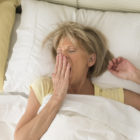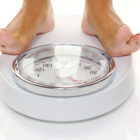Is getting enough sleep keeping you up at night? If so, here are seven sleep tips the Sandman approved. Sometimes simple lifestyle strategies and relaxing music go a long way to improving minor sleep disturbances, especially for women as they enter perimenopause and transition into menopause:
- Light sleepers do best avoiding heavy meals and large volumes of beverages in the evening or late at night. Indigestion and frequent trips to the bathroom to urinate reduce sleep quality.
- Optimize nap time during the day. When I’m running out of gas, nothing refreshes me like a short nap. To get the most out of yours, nap for 30 minutes at most and complete it before 3 pm.
- Limit alcohol, caffeine, and nicotine—This is great advice even if you don’t have difficulty sleeping, but especially during the afternoon and evening hours. Alcohol may help you fall asleep becaue it is a sedative, but later it becomes a stimulant that can wake you up later.
- Create a sleep-inducing environment. Get room darkening shades, limit noice exposure and stay cool. Dark, quiet, and cool all support sleep.
- Exercise regularly. Exercise is not only good for your body, it’s good for your mind. But get yours in before dinner to help you with sleep.
- Have a consistent sleep schedule. Waking up and going to bed at or near the same times is a key ingredient, even on weekends. Your body will automatically get you ready for sleep. Be sure to wind down at the end of the day by reading a book, listening to music, or soaking in the tub. And use the bedroom only for sleep and sex, never for work or other activities.
- Snack for Sleep. Try a slice of whole wheat toast with peanut butter and a glass of milk before bedtime. Milk and peanuts contain tryptophan that helps relax the body.
If you feel tired all the time and not well rested even though you spend enough time in bed at night, talk with your healthcare provider or see a sleep specialist to be sure you don’t have a sleep disorder such as sleep apnea. Click Here for a free sleep diary to help you determine if you have a sleep disorder. Many people are helped by my relaxing instrumental music that is music to sleep to. Music therapists are using it to help children and adults relax and sleep.




